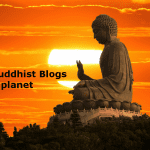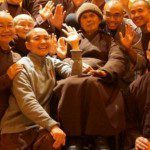A guest post by Emily J. Hooks
Understanding and practicing forgiveness has never been more important than it is today. As tensions around the world rise, we are called to stay ever more vigilant to the energy we put out into the world. The outcome of all action is determined by the source energy behind that action. Ironically, many of us who claim to understand this universal principle are reacting passionately out of fear and expecting to make a positive difference. We know that when we take action from fear we manifest fear and suffering.
Forgiveness is one of the most powerful tools we can use to help shift from fear to love because the process itself is about energetic transformation. It is best defined as a process of self-actualization (or spiritual evolution) in which we choose to move through hurt feelings such as shame, anger, and resentment (all fear-based emotions) in favor of self-love, self-compassion, and empathy for others. When we forgive, we act from love and generate a healing force in the world.
So, how do we get from here to there? If we are afraid or experiencing hurt now, what can we do to move into an experience of love before we act? It isn’t usually as simple as denying how we feel and choosing a higher vibration. We are called to take steps to facilitate transformation.
The first step is to get clear on what forgiveness is and what it is not. This may not seem relevant, but it is essential because, without clarity, we may stall because we feel we are condoning hurtful behavior or making ourselves vulnerable to the unfair actions of another.
One of the most common points of resistance many have to allowing our innate forgiving nature to emerge is believing that if we do so, we will become vulnerable. We believe that if we manifest a full expression of self-love and compassion others will try to take advantage of us and we will be less able to defend ourselves. In fact, the opposite happens when we ground ourselves in love. (Look at Mother Teresa for inspiration. Or, the unmatchable power of water despite its yielding nature.) We become clearer about what works for us and what does not. The boundaries we may have had quite tenaciously to manage from a state of fear and defensiveness, become intuitive and easy to uphold. After all, consider the rules one might have in place for protecting a child they love. There is no hesitation. We are fully grounded in an experience of love for the child and don’t question what we know to be true. The same is true as we move through forgiveness and into a full expression of self-love. We take less crap from others because we value ourselves unconditionally.
There is, however, a practical aspect of vulnerability in choosing to become a forgiving human being. That susceptibility arises when the people around us are playing by different rules. Fortunately, all this asks of us is that we engage in ongoing relationships with kindred spirits. If you sense someone does not appreciate the power and importance of approaching life with compassion, minimize opportunities to need to forgive by restricting interaction to what is absolutely necessary.
Another important concept to vet out from forgiveness is trust. We may rightly never trust someone who has caused us harm, and nor might we wish to have a relationship with them—but we can still forgive. The Buddha made a distinction between forgiveness and reconciliation that is helpful to note. He said that reconciliation is more difficult than forgiveness and is not always possible. However, forgiveness is always possible. Trust and reconciliation require something from others. These ideas demand an understanding and belief that the people who harmed us will behave differently. And, often, trust and reconciliation require compromise. Forgiveness, on the other hand, is solely internal. It is a gift we give ourselves to free us from the bonds of the past.
Next, we acknowledge our suffering. That sounds straightforward, but often we are accustomed to experiencing our suffering as other things like self-righteousness or intellectual subterfuge that we don’t realize we have been suffering at all. All energy born in fear creates suffering, however. So, personal exploration of how our sense of separation manifests brings awareness of root suffering. Once identified, we must allow for the experience of the pain without the many masks we have assigned. This is important because it is ultimately our motivation to forgive. When we fully recognize our pain and the impact it has on our world, we are compelled to change.
Finally, we choose to do the things necessary to cultivate compassion and empathy. In my book, The Power of Forgiveness: A Guide to Healing and Wholeness, I offer a framework for this. There are five character strengths we can develop to become forgiving, compassionate beings.
- Understand our story
- Emotional awareness, particularly where we hold psychological and spiritual injury in the body
- Empathy
- Non-judgment and non-resistance
- Forgiveness using an 8-Step process
Some of these competencies are easier than others. For example, children raised in empathetic families are quite naturally understanding and compassionate toward others. My encouragement is to explore the one to which you feel the most resistance. Your ego is likely trying to protect you from doing the hard work of authentic healing but, the good news is, once we have an understanding of the impact of, say, being judgmental or attached to our story as truth, we can release attachment.
Forgiveness is one of the most important transformations you will ever undertake. It is the process that will restore you to one of the deepest truths you can recognize: You have always been whole. It is from this place of love for the self that we become empowered to act boldly from a place of love. We can protest, much like the brave souls in North Dakota and transform outcomes while holding truth in the light. We can stand up to inequity without pretending to be a victim. We can be the powerful expression of unity with those who challenge us the most without distancing ourselves in fear. We can authentically demonstrate the values we hold dear.
Emily J. Hooks is an author and founder of the Forgiveness Academy. Visit The Power of Forgiveness Kickstarter page to pre-order the book, meet the author, and learn more about the book that’s empowering the world with the personal healing practice of forgiveness. http://bit.ly/forgivebook.












